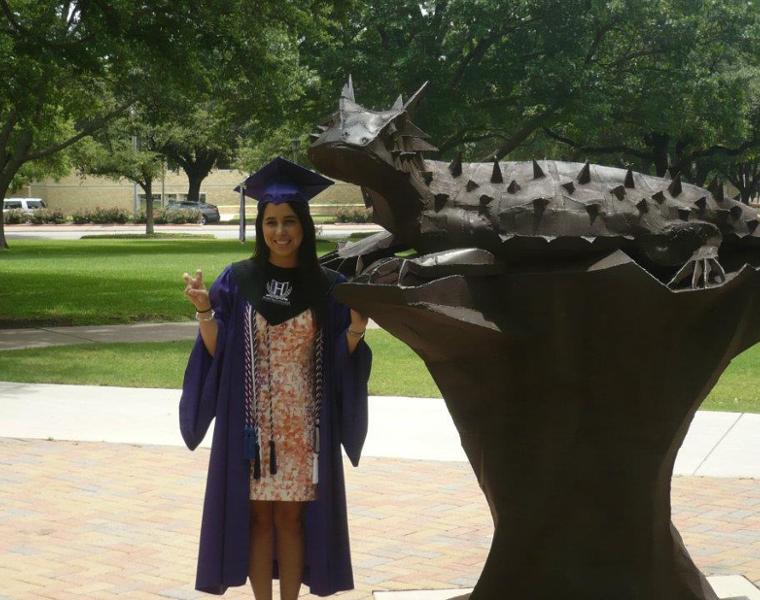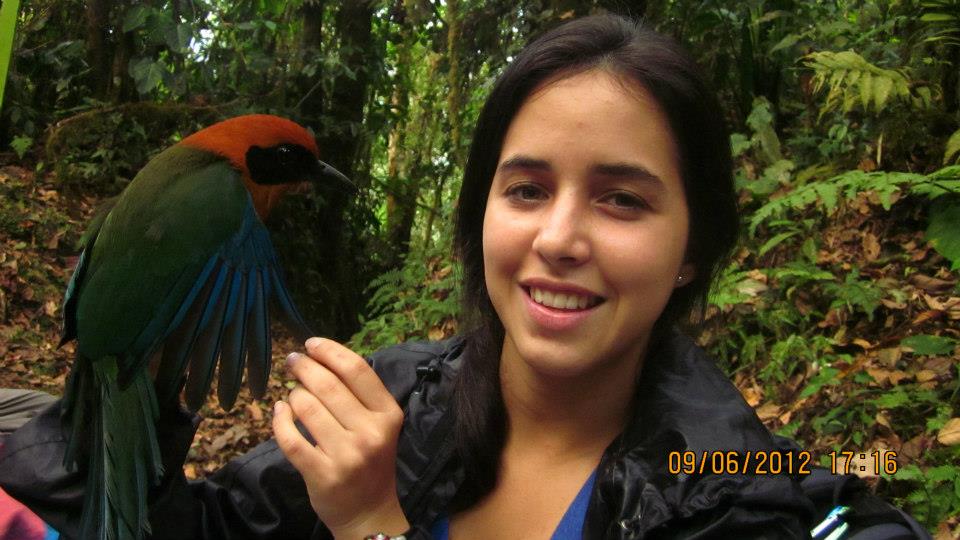
Carolina Granthon ’12 (MS ’15) graduated with bachelor’s degrees in biology and chemistry and a minor in French. Originally from Peru, Granthon took a year off to pursue an internship in the Peruvian rainforest before returning to TCU and receiving her master’s degree in biology in 2015. During her internship in Peru, Granthon learned to capture tropical birds in nets (mist-netting) and find their nests, as well as monitor nesting macaws. After finishing graduate school, Granthon worked as a research technician for Amanda Hale, professor and graduate program director, and Victoria Bennett, associate professor and graduate program director, testing an acoustic deterrent on wild-caught bats.
In 2016, Granthon moved to Hawaii to work in animal care and breeding endangered Hawaiian passerines. She started as an intern at the Maui Bird Conservation Center, and became a seasonal research assistant on the Big Island at the Keauhou Bird Conservation Center. Once her seasonal position ended, she decided to stay on the Big Island working with The University of Hawaii and United States Geological Survey (USGS), testing a pathogenic fungus infecting the island's most predominant tree species. In October 2018, Granthon joined The Peregrine Fund as a propagation specialist.
Granthon got involved with programs that breed and reintroduce endangered birds by pure luck. “An opportunity presented itself and I took it. It all started with the internship in Hawaii: I was working with the Hawaiian Crow – extinct in the wild. I always wanted to work closely with animals, and this was a great opportunity. I think this ended up being a good fit for me, since I got to be involved in the research as well,” she said.
Granthon’s passion for her work is evident. “It's an incredible opportunity and honor to help in the conservation and reintroduction of critically endangered species,” she said. “There's so much that goes on behind the scenes: pairing, incubation, rearing, mentoring, monitoring, etc. Research is vital in ensuring the successful breeding and subsequent release of these birds. The first time I heard a Hawaiian crow in the forest, or saw a free-flying California Condor, it made all the hard work worth it. They're such incredible species, and I'm glad I get to play an active role in their restoration.”
Looking back now, Granthon expressed gratitude to professors and experiences at TCU that have helped her professional career. Granthon’s graduate research was focused on avian malaria in four species of birds in the United States. “TCU helped me so much to discover the world of research. Having my mind challenged by research questions at TCU helps me tackle daily issues at my current job,” she said. “I'm incredibly grateful to TCU, all my professors, and everyone who gave me a chance along the way. A special thanks to Dr. Dean Williams for taking me into his lab and letting me explore and pursue my interests.”
“Carolina was one of the best MS students I have had – very independent, a careful researcher, good at analyzing data, and a great writer. These abilities undoubtedly make her a great addition to the propagation team at the Peregrine Fund,” said Williams.
Granthon never thought she would end up breeding endangered birds, but loves her job and the field. In the future, Granthon would like to publish information about captive breeding techniques to help bridge the gap between science and management, since there is currently little information in literature about breeding programs. She also shared some advice for future students: “Follow your passion, whatever it is, even if it takes you across the country or you have to start at the very bottom. Be open to opportunities that present themselves along the way, even if they seem like a long shot or are different from your plan.”
